Unconventional #18: Inside the new book that details how GOP delegates could wriggle out of nominating Trump (and more!)
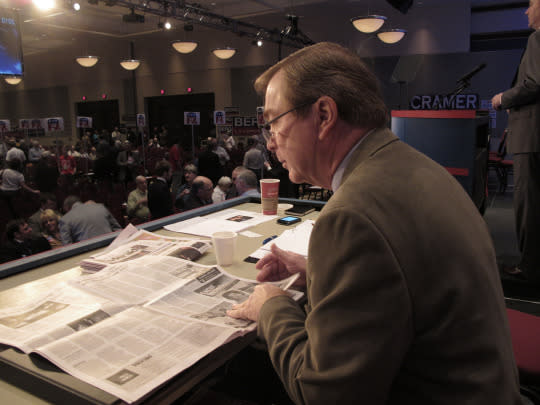
1. In his new book, a Republican National Committee official claims that his fellow delegates don’t have to nominate Trump in Cleveland. Is he right?
Curly Haugland is on a mission: He wants every one of the 2,472 delegates heading to this summer’s Republican convention to know that the press, the party leaders and even the chairman of the GOP are wrong.
According to the longtime RNC committeeman and pool-supply magnate from Bismarck, N.D., Republican delegates are not obligated by the outcome of their state’s primary or caucuses to vote for a certain candidate on the first ballot in Cleveland — despite what almost everyone else seems to believe.
They don’t have to vote for Donald Trump. They don’t have to vote for Ted Cruz. Instead, Haugland insists that the delegates can vote for anyone they please, transforming the convention into a chaotic free-for-all in the process.
“They are free to vote however they want from the very beginning,” Haugland tells Unconventional. “Everything else is based on a fraud.”
Needless to say, this argument strikes many of Haugland’s fellow Republicans as ludicrous. What was the point of the last five months of campaigning, they say, if the delegates don’t have to honor the results? At least one reporter has described Haugland as both a “rule-mongering crank” and North Dakota’s “official state pain in the ass.” His own congressman calls him a “nerd.” And RNC Chairman Reince Priebus — whose job is to keep a Trump-torn GOP from eating itself alive in Cleveland — is not a fan of Haugland’s curmudgeonly theories, declaring in a recent NBC interview that “if a delegate is bound to a candidate, even if that delegate decides later, ‘I don’t care, I’m not voting for that person,’ the secretary at the convention will read the roll as if that delegate voted for the person that they’re bound to, period.”
But Haugland isn’t crazy — and he isn’t (technically) wrong.
“Curly is historically and legally right in saying there is a lot of discretion in the action of delegates,” Elaine Kamarck, a senior fellow at the Brookings Institution and author of the new book “Primary Politics,” recently told Politico. “The only way delegates will be bound is if, when they vote on the rules of the convention, they vote to bind themselves. Otherwise, they’re not.”
History is on Haugland’s side. In their new e-book “Unbound: The Conscience of a Republican Delegate,” which comes out Thursday, Haugland and co-author Sean Parnell, a Virginia-based public policy consultant, patiently comb the record and scrutinize the Republican rulebook to sort out where exactly the GOP stood in the past on the idea of “binding” delegates — and where it stands now.
Their conclusion? “Delegates to the Republican National Convention have had, at every convention from 1856 through 2012, the full freedom to vote their consciences on all matters recognized and protected in the convention rules, with the single notable exception of 1976, when the campaign of incumbent President Gerald Ford pushed through a change in the rules as part of a strategy to deny the nomination to former California Gov. Ronald Reagan.”
As you can probably imagine, the book itself reads more like a 75-page legal brief than a potboiling bestseller. But Haugland’s argument isn’t particularly complicated. There are three basic parts:
a) The rules of the Republican National Convention have never permitted binding — except in 1976.
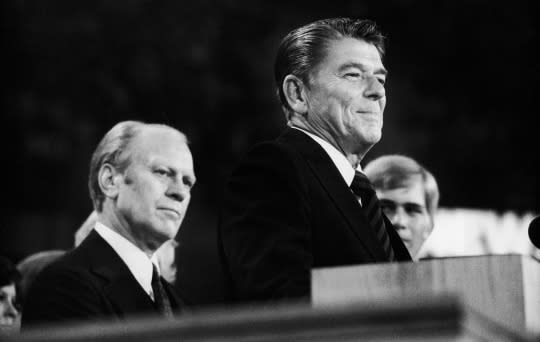
When the GOP first convened in Philadelphia in 1856, binding went by a different name: the unit rule. Because there were no primaries at the time — and thus no divvying up of delegates in accordance with the popular vote — the only way a delegate could be coerced into voting against his conscience was if his state delegation decided to maximize its impact by behaving as a “unit” and awarding all of its votes to the candidate favored by a majority of its members.
The Democratic Party allowed delegations to rely on the unit rule for more than 130 years, from 1832 to 1968. But Republicans rejected it from the start.
In 1856, James W. Webb of New York declared that the delegates had “come to this Convention to express their judgments in the earnest way that their feelings or their convictions may have prompted.” In 1860, two Maryland delegates protested when the chairman of their delegation attempted to impose the unit rule on them; the convention subsequently ruled that the dissenting delegates would be allowed to “vote as [they] please[d].” In 1868 and 1876, similar skirmishes broke out between the chairman of the Pennsylvania delegation and various Pennsylvania delegates, and both times the convention upheld “the right of every individual member … to vote his individual sentiments.”
Finally, in 1880, sitting Congressman and Senator-elect James Garfield of Ohio — that year’s Rules Committee chair and eventual Republican presidential nominee — crafted a rule specifying the procedure by which each delegate would be allowed to vote individually, according to his judgment and conscience.
“In case the vote of any State, territory, or District of Columbia shall be divided, the chairman shall announce the number of votes cast for any candidate, or for or against any proposition,” read Rule 8. “But if exception is taken by any delegate to the correctness of such announcement by the chairman of his delegation, the President of the Convention shall direct the roll of members of such delegation to be called, and the result shall be recorded with the votes individually given.”
“There never was a convention, there never can be a convention, of which I am one delegate, equal in rights to every other delegate, that shall bind my vote against my will on any question whatever,” Garfield added.
The Garfield rule remained in effect even after primaries became part of the nominating process in 1912; that year, the convention ignored the Oregon and Illinois primary results and allowed delegates from those states to vote however they pleased.
Meanwhile, Garfield’s language itself went largely unchanged until 1964, when the convention, seeking to clarify the GOP’s long-standing policy, finally added an explicit ban on the unit rule.
“No delegate or alternate shall be bound by any attempt of any state or Congressional District, the District of Columbia, Puerto Rico, or The Virgin Islands to impose the unit rule,” the amendment read — and it still reads the same way today.
Only in 1976 did the convention rules explicitly permit the binding of delegates. Desperate to lock down as many delegates as possible — and fearful that delegates who originally came to the convention pledged to him would defect to Reagan, his charismatic rival — Ford and his loyalists on the Rules Committee managed to amend the Garfield rule so that “the vote of each State for the nomination for President shall be announced and recorded … in accordance with the results of any binding Presidential Primary or direct election of delegates bound or pledged pursuant to state law.”
But the new language didn’t last long: Four years later, the Rules Committee decided to delete it altogether.
“I believe the people of Illinois, of Massachusetts, of Connecticut, and of possibly New Hampshire, will find themselves in the envious position at this convention of casting their votes for a left-wing lunatic by the name of John Anderson,” joked one committeeman, referring to the Illinois Republican who had performed well in several primaries before bolting the party to run as an independent. “I would not impose that burden upon the conscience of any Republican.”
“This amendment was put in in 1976 as a result of some political shenanigans at that time,” added another. “Now we are just going back to the old way.”
Not a single member voted against the change.
b) Regardless, various other bodies — state parties, state legislatures and even the Republican National Committee — have passed rules and laws intended to bind delegates.
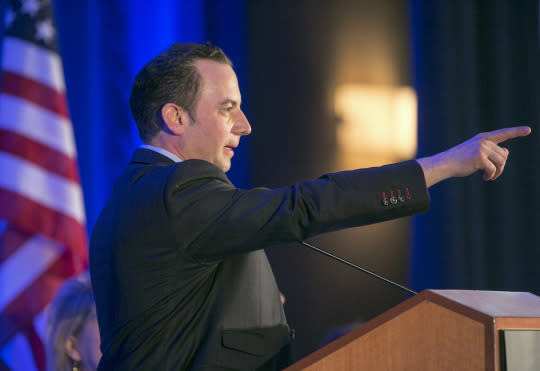
There’s a reason that everybody thinks that 1,169 delegates are currently bound to vote for Trump on the first ballot in Cleveland: because state parties, state legislatures and the Republican National Committee have basically said as much.
As early as 1860, at least one state Republican Party — Maryland’s — “recommended” that all of its delegates vote for a particular presidential candidate. Since then, state GOPs have issued a dizzying array of instructions regarding how their delegates will be allocated and even bound — especially after primaries and caucuses started to dominate the process in the 1970s.
Meanwhile, nearly every state legislature has passed some sort of law directing convention delegates to vote in accordance with its primary or caucus results, and even the Republican National Committee has recently endorsed this position, rearranging and revising its rules to reflect state-level changes. In 2008, for instance, the RNC added references to “allocation” and “binding” to a pair of rules about the selection and election of delegates. And in April 2013, the national party rewrote Rule 16 to clarify that “any statewide presidential preference vote that permits a choice among candidates for the Republican nomination for President of the United States in a primary, caucus, or a state convention must be used to allocate and bind the state’s delegation to the national convention in either a proportional or winner-take-all manner.”
The new rule went on to state that:
The Secretary of the Convention shall faithfully announce and record each delegate’s vote in accordance with the delegate’s obligation under these rules, state law, or state party rule. If any delegate bound by these rules, state party rules or state law to vote for a presidential candidate at the national convention demonstrates support … for any person other than the candidate to whom he or she is bound, such support shall not be recognized.
This is the rule that RNC Chairman Priebus was citing when he dismissed Haugland’s “nerdy” arguments on NBC. Seems pretty cut and dried, right?
Not so fast.
c) None of these state laws or party rules actually govern the convention itself.
This part of Haugland’s book is a little legalistic. But we’ll try to keep it simple.
Whenever Republicans have raised the question of whether state or national party rules take precedence — in recent years as well as in, say, 1880 — the national rules have won out. Which means that a national convention rule outlawing the binding of delegates — the Garfield rule, according to Haugland — trumps any state party rule permitting the practice.
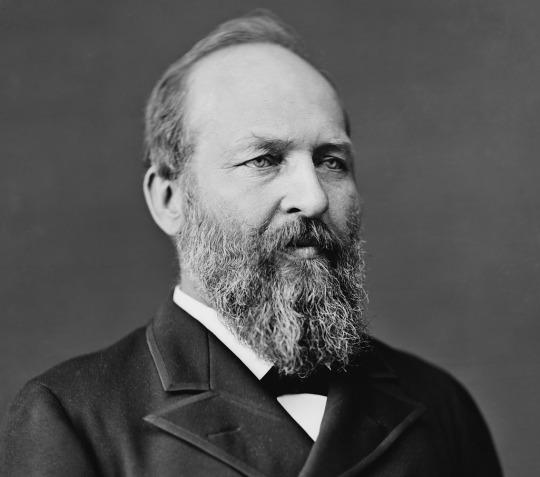
The courts, meanwhile, have repeatedly found, in Lynch v. Torquato, Cousins v. Wigoda, and Democratic Party of the United States v. Wisconsin ex rel. La Follette, among other cases, that, under the First Amendment’s right of freedom of association, the state cannot intrude on the internal matters of a political party — like the election or selection of delegates to a national convention. Which means that state laws aren’t enforceable here, either.
But what about the national GOP’s own rules? Surely they apply. Of course, says Haugland: They apply to the period between conventions. But they don’t apply to the convention itself.
That’s because the recent GOP rules about binding were inserted into a totally different section of the rulebook — the section that governs “the convening of the convention.” These rules, Haugland and Parnell write, “expire at the start of that convention and have no authority as to how the convention is run. Instead, each convention establishes its own rules, and in 2012 the standing rules approved by the Republican National Convention retained the full, historical protections for delegates contained in [the Garfield rule].”
This sounds odd, but Haugland is right. The recent GOP rules will expire at the start of the 2016 convention unless the Rules Committee — and the delegates themselves — add them into the standing rules of the convention in much the same way the Ford campaign added binding language in 1976. Otherwise, the Garfield rule will continue to hold sway — and the recent GOP rules will be moot.
Does Haugland ultimately think that thousands of Republican delegates will rise up in Cleveland and deliver the nomination to someone other than Trump — someone like, say, Cruz, whose zombie campaign is still managing to get loyal delegates elected in places like Washington state?
He does not. “This time it appears Reince [Priebus] and the cable news networks have announced that we have a nominee,” Haugland huffs, acknowledging that current conventional wisdom makes it all but impossible to revert back to the old way of doing things.
Still, Haugland is convinced — in his cranky, nerdy, pain-in-the-ass way — that his fellow delegates need to know their rights. What if, for example, they have to vote their conscience? What if they have to revolt?
What if, as Haugland and Parnell put it in “Unbound,” a delegate is “bound” to “a candidate [who] is dramatically out of step with the principles and values of the Republican Party” — someone like former Ku Klux Klan leader David Duke, who campaigned for the Republican nomination in 1992 and might have earned some delegates had Pat Buchanan not run at the same time?

What if “circumstances … change and new knowledge about candidates [is] uncovered between the primary and the time the delegates must cast their vote on the convention floor” — knowledge akin to the news, which was confirmed a few weeks before the 2008 Democratic National Convention, that former North Carolina Sen. John Edwards had fathered a child with his mistress while his wife was battling cancer?
And what if it “become[s] obvious [that] a particular candidate is unable to mount a competitive, credible and competent campaign”?
“Envision a scenario in which one candidate collects enough delegates to become the presumptive nominee of the party, but before the convention he or she engages in behavior or makes statements that all but guarantee a crushing defeat in the general election,” Haugland and Parnell write. “In such a scenario, should the delegates be forced to effectively cede the presidency because of votes cast before under different circumstances?”
It’s unlikely that Trump will make Haugland’s hypothetical a reality. Even so, it’s less unlikely with Trump than with any prior presumptive Republican nominee — and Haugland wants his party to be prepared, just in case.
“The only hope I have is to educate the delegates,” Haugland says. “They actually own the rights to control the convention, but most of them don’t know it. They’re convinced they have no choice. They get lied to all the time.”
_____
2. “Was Trump’s New Mexico rally a preview of the convention?”

Attacks on his fellow Republicans. Lots of GOP no-shows. Protesters inside the event — and near-riots on the streets outside.
If you want to know how a Donald Trump convention might unfold, look no further than Trump’s rally Tuesday night in Albuquerque, N.M.
Yahoo News National Correspondent Holly Bailey reported from the scene:
Donald Trump returned to the campaign trail with force Tuesday, veering away from his recent calls for party unity to attack New Mexico Gov. Susana Martinez, a rising star Republican and frequent critic of his campaign, as a poor leader who hasn’t done enough to stem economic problems in her state.
“You’ve got to get your governor to do a better job. She’s not doing her job,” Trump said at a convention center here, at one point joking that “maybe” he should run for New Mexico governor.
The presumptive Republican presidential nominee also argued Martinez has put her state at risk by accepting Syrian refugees in New Mexico.
“Syrian refugees are being relocated in large numbers to New Mexico. If I was governor, that wouldn’t be happening,” Trump said, renewing his push for a temporary ban on refugees. He urged greater vetting and control of refugees, warning the alternative is “we are not going to have a country.”
Trump’s comments came as Martinez, who is currently head of the Republican Governors Association, has notably declined to say if she will endorse him as the GOP nominee. She and other state Republican leaders were no-shows at Trump’s raucous rally here Tuesday — his first campaign visit to New Mexico — which was repeatedly interrupted by protesters both inside and outside the venue.
Trump protesters smash door, break through barriers: https://t.co/RX8BVCval4 @jasoncarrollcnn reports. https://t.co/hmPGDZa4R7
— New Day (@NewDay) May 25, 2016
As Trump spoke, several hundred protesters outside the convention center rushed police, trying to storm the building. When they were blocked, they lobbed rocks at cops, who reportedly tear-gassed the crowd. A glass door at the convention center was shattered by what police later said was a shot from a pellet gun.
FOX NEWS ALERT: Protests turn violent outside of Trump rally in Albuquerquehttps://t.co/HDIZYG4WFI
— FOX & Friends (@foxandfriends) May 25, 2016
Inside, it was at times just as tense, as protesters waving signs trashing Trump’s anti-immigrant rhetoric interrupted the candidate more than a dozen times. At one point, the GOP candidate instructed his supporters to ignore the disruptions — insisting “their voices are so weak, I can’t hear them.” But then seconds later, Trump abruptly whipped around to see cops forcibly dragging a female protester in the bleachers behind him from her seat.
Silent for more than a minute, Trump finally turned to the crowd and said, “This is exciting, isn’t it?”
Read the rest of Bailey’s dispatch here.
_____
3. The Trump (and Clinton!) Veepwatch, Vol. ¾: Mark Cuban
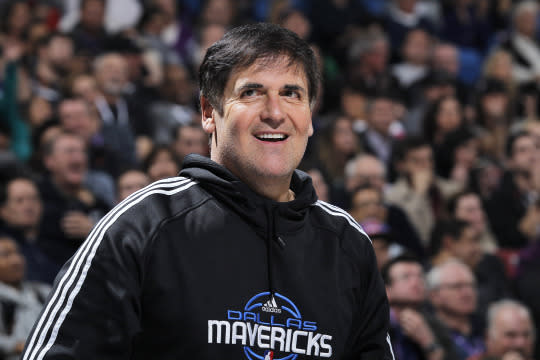
In which Unconventional examines the likely nominees’ possible — and not-so-possible — vice presidential picks. Previous Trump installments: Newt Gingrich, Jan Brewer, Bob Corker. Previous Clinton installments: Elizabeth Warren, Tim Kaine.
By Susanna Heller
Name: Mark Cuban
Age: 57
Résumé: Owner of the Dallas Mavericks, chairman of AXS TV cable network, co-owner of 2929 Entertainment, owner of Landmark Theatres, investor on “Shark Tank”
Source of speculation: Cuban himself. An independent whose views lean libertarian, the entrepreneur would apparently be willing to run alongside either Donald Trump or Hillary Clinton.
Yes, you read that right: Cuban has offered his services to both parties’ likely presidential nominees.
Cuban first told Business Insider that he would “consider” joining Trump’s ticket way back in July 2015.
“Would I consider? Yes,” Cuban said via his private messaging app, Cyber Dust, which he was (duh) promoting at the time. “Would I do it? Probably not. I’m not cut out for politics. At least [the] way they are now. Maybe in the future if Trump truly impacts how the game is played.”
By February, however, Cuban had furthered warmed to the idea. “As long as [Trump] said [he’d] listen to me in everything I said,” Cuban told KTCK in Dallas, “we’d be OK.”
More recently, Cuban has begun to tout himself as a possible VP for Clinton as well. informing NBC’s Chuck Todd on Friday that he would “absolutely” be interested in the gig — with one caveat.
“She would have to go more to center,” said the “fiercely independent” businessman. “I like the fact that Senator Clinton has thought-out proposals. That’s a good thing because at least we get to see exactly where she stands.”
“If she’s willing to listen, if she’s willing to hear other sides of things, then I’m wide open to discussing it,” Cuban added.
The craziest part of all this? Clinton seems intrigued. In a separate interview with “Meet the Press,” she said she’s “very interested” in a veep from the private sector; that she appreciates Cuban’s “openness”; and that she’d like to meet with him regarding the idea.
“I think we should look widely and broadly,” Clinton explained. “It’s not just people in elective office. It is successful businesspeople.”
Backstory: Cuban hasn’t always had nice things to say about Trump or Clinton.
In 2012, Trump and Cuban engaged in a Twitter spat after Cuban offered to donate $1 million to the victims of Superstorm Sandy if Trump agreed to shave his head.
Trump was unhappy with the proposition, to say the least.
Dummy @mcuban is at it again trying to use me to get publicity for himself!
— Donald J. Trump (@realDonaldTrump) November 5, 2012
Only 1 mill. dollars @mcuban? Offer me real money and I’d consider it. Your team and networks lose so much money I doubt you have much left!
— Donald J. Trump (@realDonaldTrump) November 5, 2012
.@mcuban When Apprentice became the #1 show on tv you tried copying me with The Benefactor- a complete and total ratings disaster for @ABC.
— Donald J. Trump (@realDonaldTrump) November 5, 2012
.@mcuban, Shark Tank was shoved to Friday evening– Friday is considered “dead television.” Besides, you are not the star (& never will be).
— Donald J. Trump (@realDonaldTrump) November 5, 2012
The feud was never quite resolved. On CNBC earlier this month, Cuban described Trump as “horrible on Twitter.” He has also questioned Trump’s aggressive attitude and loose grasp on policy.
And prior to last weekend, Cuban had only been critical of the Clinton campaign.
In February, for instance, he told Inc. that Hillary was technologically ignorant — and polarizing to boot.
“I think Hillary is smart,” Cuban said, “but she’s just upset so many people on the other side, that it’s going to be very, very difficult.”
He even considered running against them as an independent after a group of #NeverTrump conservatives approached him earlier this month.
But Cuban ultimately rejected the offer.
“There’s not enough time to get on the ballot,” he said. “The hurdles are just too great. It was a ridiculous effort, so I passed.”
Odds: Ridiculously low. The thinking behind a Cuban candidacy — whether presidential or vice presidential — is simple: When you’ve already got one swaggering, politically outspoken mogul in the mix, why not add another? Perhaps every presidential candidate needs to be a reality TV star these days.

As Cuban himself put it on Cyber Dust last July, “Up until Trump announced his candidacy the conventional wisdom was that you had to be a professional politician in order to run. You had to have a background that was politically scrubbed. In other words, smart people who didn’t live perfect lives could never run. Smart people who didn’t want their families put under the media spotlight wouldn’t run. The Donald is changing all of that. He has changed the game and for that he deserves a lot of credit.”
But Trump has already ruled out the idea of putting another businessman on his ticket, saying he would prefer an experienced pol instead. And Clinton is likely just paying lip service to Cuban’s offer — perhaps as a way of earning his endorsement (and a donation or two).
Cuban probably knows all of this, which is why he keeps saying that if he were to run for VP, Trump or Clinton would have to change their views to agree with him. That’s not going to happen.
Still, the press is eating it up. And as “Dilbert” creator Scott Adams points out on his blog, “the real play for Cuban, I assume, is to prep the public and the media for his future run at the top spot, once the idea of a brash billionaire as president seems like normal business. Maybe in four years. Maybe eight. He’s raising his name recognition now, to keep his options open. Smart.”
Cuban himself has already said as much, telling Business Insider that he’s also open to the idea of a White House run in 2020.
“If Kanye is a party nominee,” Cuban said, “I’ll run against him.”
_____
4. Video: John Hickenlooper tells Katie Couric he probably would serve as Clinton’s running mate
Colorado Gov. John Hickenlooper, rumored to be on the shortlist of candidates to be Hillary Clinton’s running mate, said he “probably would” accept the job if offered.
“I love what I’m doing,” Hickenlooper, who supports Clinton, told Yahoo Global News Anchor Katie Couric, “but you know, to serve your country at that level would be an amazing honor. … The vice president can play a real role in that, in helping solve some of the biggest problems in the country. I think I’d be a fool if I didn’t seriously look at it.”
Hickenlooper has just released a new memoir titled “The Opposite of Woe: My Life in Beer and Politics.” He’s one of the most candid politicians in America. Make sure to watch his entire interview with Couric — he also talks about why the kind of “populist energy” driving the Bernie Sanders campaign “isn’t always in the best interest of the party” — then let us know on twitter (@andrewromano) whether you think he’d make a good running mate for Clinton.
_____

5. The best of the rest
NEW Paul Ryan has told confidants he regrets Trump standoff, Team Trump says endorsement coming. via @HouseInSession https://t.co/nmVigbfrfM
— Jennifer Jacobs (@JenniferJJacobs) May 25, 2016
How Ted Cruz backers at RNC convention plan to prevent Trump-like candidates in 2020 https://t.co/jRGaIOK8ts w/@hookjan
— Reid J. Epstein (@reidepstein) May 25, 2016
Scoop from @agearan: The DNC will split up the platform committee 6-5, Clinton to Sanders supporters. https://t.co/lRNAPWQCWn
— daveweigel (@daveweigel) May 23, 2016
Scoop: John Kasich instructs his 161 delegates to remain bound to him through the GOP convention https://t.co/FY9m9CAHZ8
— Philip Rucker (@PhilipRucker) May 24, 2016
Two recent nat'l polls show Gary Johnson at 10% … shades of Ross Perot & the 90s, America! I got some #’s here: https://t.co/TI2ZnKZcLN
— Clare Malone (@ClareMalone) May 24, 2016
_____
Countdown
For the latest data, make sure to check the Yahoo News delegate scorecard and primary calendar.




